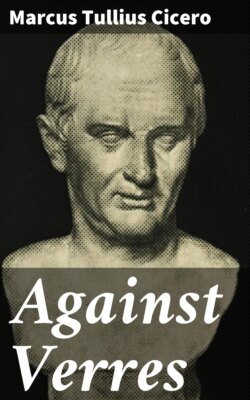Читать книгу Against Verres - Marcus Tullius Cicero - Страница 63
На сайте Литреса книга снята с продажи.
41
ОглавлениеTable of Contents
Publius Annius Asellus died while Caius Sacerdos was praetor. As he had an only daughter, and as he was not included in the census,[15] he did what nature prompted, and what no law forbade,—he appointed his daughter heiress of all his property. His daughter was his heiress. Everything made for the orphan; the equity of the law, the wish of the father, the edicts of the praetors, the usage of the law which existed at the time that Asellus died. 105That fellow, being praetor elect, (whether being instigated by others, or being tempted by circumstances, or whether, from the instinctive sagacity which he has in such matters, he came of his own accord to this rascality, without any prompter, without any informer, I know not; you only know the audacity and insanity of the man,) appeals to Lucius Annius as the heir, (who indeed was appointed heir after the daughter,) for I cannot be persuaded that Verres was appealed to by him; he says that he can give him the inheritance by an edict; he instructs the man in what can be done. To the one the property appeared desirable, the other thought that he could sell it. Verres, although he is of singular audacity, still sent privately to the young girl's mother; he preferred taking money for not issuing any new edict, to interposing so shameful and inhuman a decree. 106Her guardians, if they gave money to the praetor in the name of their ward, especially if it were a huge sum, did not see how they could enter it in their accounts; did not see how they could give it except at their own risk; and at the same time they did not believe that he would be so wicked. Being often applied to, they refused. I pray you, take notice, how equitable a decree he issued at the will of the man to whom he was giving the inheritance of which the children were robbed. "As I understand that the Lex Voconia..." Who would ever believe that Verres would be an adversary of women? or did he do something contrary to the interests of women, in order that the whole edict might not appear to have been drawn up at the will of Chelidon. He wishes, he says, to oppose the covetousness of men. Oh, certainly. Who, not only in the present age, but even in the times of our ancestors, was ever so far removed from covetousness? Recite what comes next, I beg; for the gravity of the man, his knowledge of the law, and his authority delight me. "Who, since the censorship of Aulus Postumius and Quintus Fulvius, has made, or shall have made..." Has made, or shall have made! who ever issued an edict in such a manner? 107Who ever proposed by an edict any penalty or danger for an act which could not be provided for otherwise either before the edict or after the edict?
